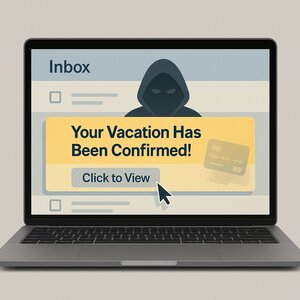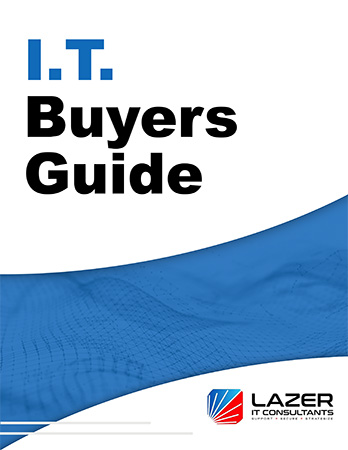
Planning a summer vacation or business trip? Before you open that booking confirmation, you need to double-check where it really came from.
Fake travel e-mail scams are on the rise, and even savvy business professionals are falling for them. These lookalike messages mimic trusted travel brands and are designed to steal your login credentials, credit card info, or worse—infect your device and network with malware.
And yes, they’re hitting both individuals and businesses hard.
How The Fake Travel E-mail Scam Works
1. A Convincing E-mail Lands In Your Inbox
It looks official—maybe from Delta, Expedia, Marriott or another big-name travel company. It might include urgent subject lines like:
-
“Action Required: Confirm Your Hotel Stay”
-
“Your Flight Itinerary Has Changed – Click Here For Updates”
-
“Final Step: Complete Your Rental Car Reservation”
The formatting is on point. The logo is correct. It even has a fake customer support number. But it’s not real.
2. You Click A Link And Land On A Fake Site
The link takes you to a website that looks exactly like the legitimate company’s portal. You're prompted to “log in” or “confirm payment” details. The second you do, hackers collect your credentials or credit card info.
Sometimes, clicking the link installs malware that infiltrates your device or your company’s network.
3. Your Data (Or Your Business) Gets Compromised
These scams are highly effective because they exploit urgency and look legitimate. And if your team is booking work travel? The risk multiplies:
-
Corporate credit cards can be used for fraudulent charges.
-
Company travel portals or e-mail logins can be breached.
-
Malware can be introduced into your network from one employee’s mistake.
How To Protect Your Business During Travel Season
This scam may be aimed at travelers, but it poses serious business risks too—especially if your admin or travel coordinator handles bookings for multiple employees.
Here’s how to protect your team:
✅ Verify All Travel E-mails Manually
Instead of clicking links, open a browser and go directly to the airline, hotel or travel site. Bookmark your trusted sites.
✅ Double-Check E-mail Addresses
Look for subtle domain changes like @deltacom.com vs. @delta.com. One letter off is a red flag.
✅ Train Your Team
If someone in your office books corporate travel, they need to recognize phishing scams. Sign up for our weekly Cybersecurity Tech Tips to stay ahead of evolving scams.
✅ Enable Multifactor Authentication (MFA)
Even if credentials are compromised, MFA can prevent unauthorized access. If your team isn’t using it across all accounts, it’s time to start.
✅ Lock Down Your Business E-mail Accounts
Use advanced filtering and network security tools to block malicious links and prevent email-based malware before it reaches your inbox.
Don’t Let One Click Cost Your Company
Cybercriminals know exactly how to exploit busy professionals—and travel season is their opportunity.
Want to make sure your systems are safe? Schedule a free discovery call with our team to talk through your current security setup and identify any weak spots.
We’ll help you stay protected and prepared.
👉 Click here to schedule your FREE Cybersecurity Assessment today and ensure your business is phishing-proof this summer.



